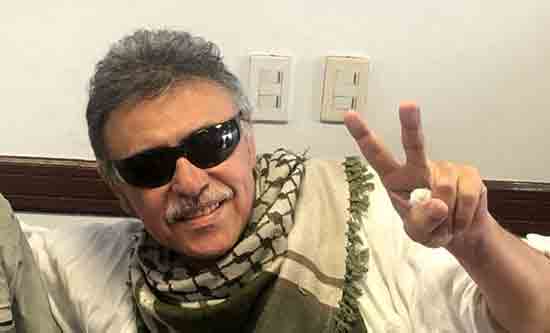
Jesus Santrich, a former com-man-der in the now-demobilised Revolutionary Armed Forces of Colombia (FARC), was arrested on 9 April after the US Drug Enforcement Administration demanded his extradition on unsup-ported charges of drug trafficking. Santrich is accused by the US of running a $15m drug operation in Colombia after the peace agreement was signed in 2016, which he and his FARC party deny.
On 15 May 2019 the Special Jurisdiction for Peace (JEP) ordered the Office of the Attorney General to release Santrich so that he could take his seat in Congress. The special court ordered that he not be extradited to the US given its refusal to provide evidence. Santrich was a key member of Colombia’s Peace Accord signed in Havana between the FARC and the Manuel Santos government. He always denied these accusations. Infuriated at the judgement, ex-president, now senator Alvaro Uribe, insisted he be handed over to US imperialism.
On 17 May, the day after he was told that the government would breach the peace agreement and deliver him to the US, Santrich cut his wrists. He has no intention of ending up in a US cell. His life was saved. However, once wheeled out of the maximum-security prison he was seized by armed guards, thrust into a helicopter and flown to the Public Prosecutor’s office secure facility. Consequently he had to be taken to hospital with a respiratory/cardiac crisis. The US suddenly made public new illegally gathered evidence, of unclear date, to support the allegations. Finally his arrest was legalised by a judge.
The UN Verification Mission in Colombia and the Office of the High Commissioner for Human Rights jointly declared: ‘We trust that the due process of Mr Seuxis Paucias Hernandez Solarte (Jesus Santrich) will be respected and that his right to defence will be guaranteed.’
President Ivan Duque promised to limit the JEP in his election campaign, and this is consistent with the 85 murders of ex-FARC military personnel since the Peace Agreement. Attempting to live in peace, they are gunned down. Even The New York Times accused the Colombian Army of returning to extrajudicial executions.
Since the Peace Accord, with the removal of the constraints imposed by FARC, cocaine exports from Colombia have doubled. More than 400 social leaders and human rights activists have been killed in Colombia since 2016, the majority in zones no longer protected by the old FARC.
Alvaro Michaels




